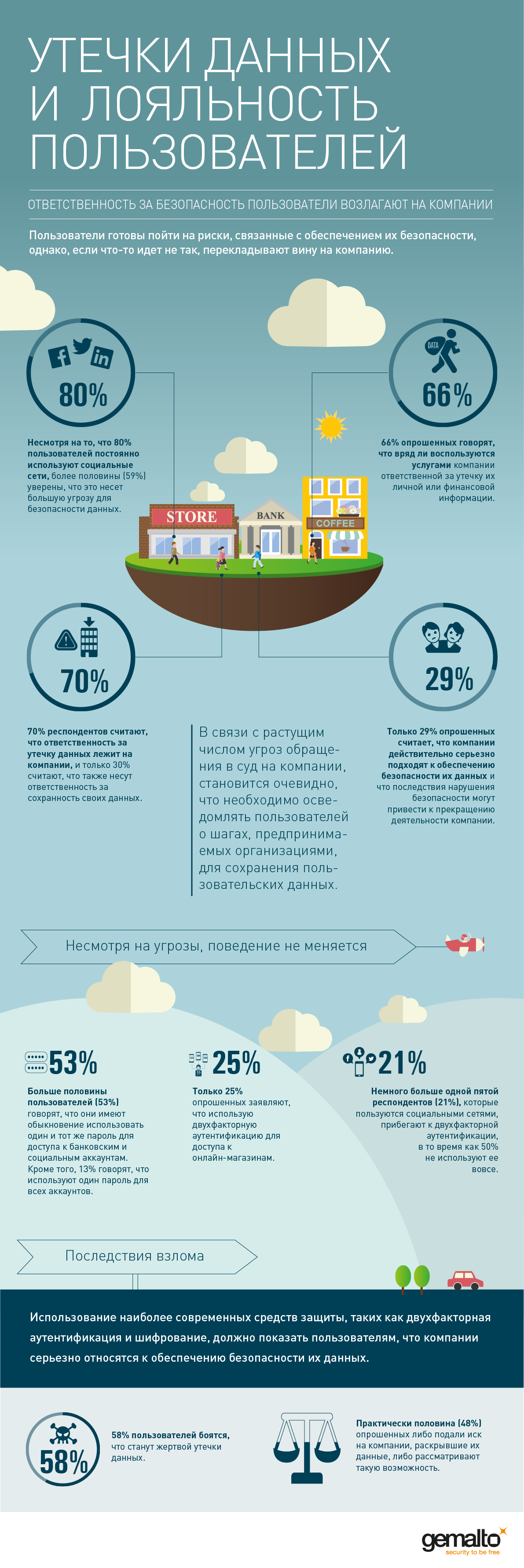Securing user data: who is responsible for this?
Almost every day we see in the news reports that as a result of leaks huge amounts of user data are being compromised. Most of us are familiar with the risks to which our personal data are exposed, but as users, we often try not to pay attention to this or expect that the company that provides the service will take responsibility for these risks. Who is responsible for security?

According to a recent survey, consumers almost do not feel any responsibility for themselves and the need to protect their own data. According to leakage research and their impact on Gemalto 2016 Data Breaches and Customer Loyalty consumer loyalty, users prefer to assume that the responsibility for ensuring data security lies not with themselves, but with those organizations and companies whose services they use in conducting transactions and for communications. According to 9000 consumers surveyed during a global survey, 70% of the responsibility for protecting and securing customer data rests with companies, and only 30% responsibility lies with the users themselves.
Usually we often pay attention to the convenience of working with services and leave security issues at the mercy of those companies that provide these services. Approximately six out of ten consumers (58%) believe that sooner or later they will be a victim of data leakage. Organizations should be prepared for business losses that could be triggered by similar causes — this is also confirmed by the results of the survey. Most consumers believe that if they become a victim of a leak, they will no longer use the relevant store (60%), bank (58%) or social network (56%), while 66% of respondents say they are unlikely to want to contact the organization where the data leak occurred, resulting in the theft of financial information or other confidential data.
')
It seems that consumers have already decided for themselves that they are ready to accept the risks associated with the security of their data, but still, if something goes wrong, they will blame the company for everything. However, we can not afford to shift the blame on each other. Legislation adopted by a number of countries places the responsibility for data protection on companies - in particular, this is provided for by the General Data Protection Regulations (GDPR) and other laws obliging companies to disclose data breach disclosure laws. However, consumers should themselves take advantage of the technologies available today to protect their own data. In particular, many banks, online stores and social networking sites provide for two-factor authentication. But unfortunately, often for the sake of convenience, we do not use this opportunity.

For modern consumers, the most important thing is convenience, and they expect that companies will provide them with the necessary level of comfort, but at the same time they will not forget about the protection of their data. Given the growing number of consumers who sue companies, it is clear that they need to explain to consumers what steps they should take to protect their data.
Implementing more advanced protocols and learning how to work with tools such as two-factor authentication or data encryption solutions is designed to demonstrate to users that organizations are taking the most serious measures to protect their customers' personal data.
For more information about the findings of our research on data leaks and their impact on consumer loyalty, please refer to the 2016 Data Breaches and Consumer Loyalty Report .

According to a recent survey, consumers almost do not feel any responsibility for themselves and the need to protect their own data. According to leakage research and their impact on Gemalto 2016 Data Breaches and Customer Loyalty consumer loyalty, users prefer to assume that the responsibility for ensuring data security lies not with themselves, but with those organizations and companies whose services they use in conducting transactions and for communications. According to 9000 consumers surveyed during a global survey, 70% of the responsibility for protecting and securing customer data rests with companies, and only 30% responsibility lies with the users themselves.
Usually we often pay attention to the convenience of working with services and leave security issues at the mercy of those companies that provide these services. Approximately six out of ten consumers (58%) believe that sooner or later they will be a victim of data leakage. Organizations should be prepared for business losses that could be triggered by similar causes — this is also confirmed by the results of the survey. Most consumers believe that if they become a victim of a leak, they will no longer use the relevant store (60%), bank (58%) or social network (56%), while 66% of respondents say they are unlikely to want to contact the organization where the data leak occurred, resulting in the theft of financial information or other confidential data.
')
It seems that consumers have already decided for themselves that they are ready to accept the risks associated with the security of their data, but still, if something goes wrong, they will blame the company for everything. However, we can not afford to shift the blame on each other. Legislation adopted by a number of countries places the responsibility for data protection on companies - in particular, this is provided for by the General Data Protection Regulations (GDPR) and other laws obliging companies to disclose data breach disclosure laws. However, consumers should themselves take advantage of the technologies available today to protect their own data. In particular, many banks, online stores and social networking sites provide for two-factor authentication. But unfortunately, often for the sake of convenience, we do not use this opportunity.

For modern consumers, the most important thing is convenience, and they expect that companies will provide them with the necessary level of comfort, but at the same time they will not forget about the protection of their data. Given the growing number of consumers who sue companies, it is clear that they need to explain to consumers what steps they should take to protect their data.
Implementing more advanced protocols and learning how to work with tools such as two-factor authentication or data encryption solutions is designed to demonstrate to users that organizations are taking the most serious measures to protect their customers' personal data.
For more information about the findings of our research on data leaks and their impact on consumer loyalty, please refer to the 2016 Data Breaches and Consumer Loyalty Report .
Source: https://habr.com/ru/post/321308/
All Articles